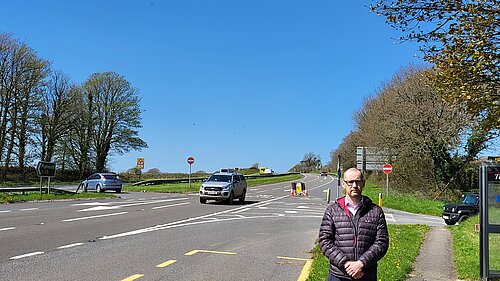The value of a Cornish life!

A fortnight ago, I wrote about the long-standing difficulties in getting the Department for Transport and National Highways to implement basic safety measures such as reduced speed limits and average speed cameras on the A38 in South East Cornwall. But even if our MP does manage to get the project bumped up from its current status of “might get funded in 2030”, this will still only be fiddling around the edges of what is really a much bigger problem.
Quite simply, much of the A38 in South East Cornwall simply isn’t fit for its job of carrying over 20,000 vehicles per day safely and efficiently between Bodmin, Liskeard, Saltash and Plymouth. The single-carriageway sections are full of awkward bends, concealed entrances and tricky junctions. The dual-carriageways have many of the same hazards, but with traffic travelling at higher speeds! And every time another collision occurs and the road is closed, the surrounding lanes quickly become gridlocked.
Unfortunately, despite all the promises of “Levelling Up”, the Government’s own policies actively discriminate against projects in poorer parts of the country. Obviously a Cornish road carrying 20,000 vehicles per day is not going to get the same funding as a bigger road, but I was shocked to discover that the “value for money” formula applied by the Conservative Government actually says our time is worth less! Cornish wages are significantly lower than the national average, so every hour a Cornish worker spends in a traffic jam is less “valuable” than an hour of the average UK worker’s time. And since this Government calculates the “value” of a human life based on economic output, this rule means that an upgrade which saved ten lives in Kent or Essex would be funded ahead of an upgrade which saved ten lives in Cornwall! This is how the Government justifies spending £9 billion to build a new road across the Thames Estuary from Tilbury to Gravesend, but cannot find £50,000 to install a pedestrian crossing in Tideford!
The irony is that it is precisely this lack of investment in infrastructure which makes workers in Cornwall less productive than the UK average. If Cornish businesses have to contend with slow, unreliable roads and railways, threadbare bus services, poor mobile phone coverage and below-average broadband, then it is inevitable that they will end up being less profitable and paying lower wages.
The Liberal Democrats fought long and hard to secure EU funding to help Cornwall catch up with the rest of the country. If the Conservatives were serious about “Levelling Up”, they would reverse the Treasury’s “value for money” calculations and spend more money in the areas where wages are lowest, giving everyone the opportunity to earn a decent living and contribute to the growth of the national economy.